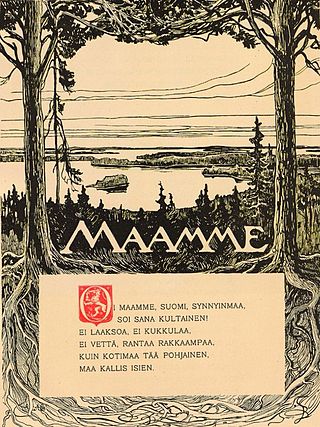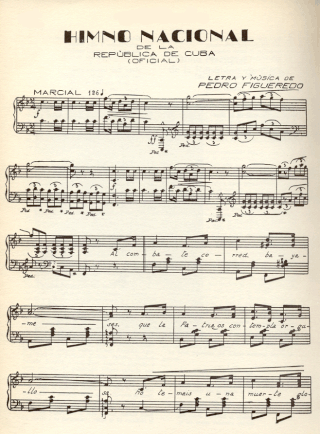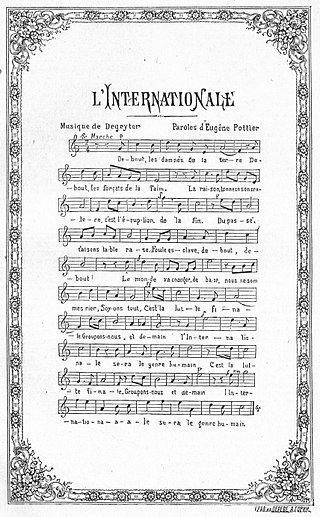Related Research Articles

"America the Beautiful" is a patriotic American song. Its lyrics were written by Katharine Lee Bates and its music was composed by church organist and choirmaster Samuel A. Ward at Grace Episcopal Church in Newark, New Jersey. The two never met.

"Jana Gana Mana" is the national anthem of the Republic of India. It was originally composed as Bharoto Bhagyo Bidhata in Bengali by polymath Rabindranath Tagore on 11 December 1911. The first stanza of the song Bharoto Bhagyo Bidhata was adopted by the Constituent Assembly of India as the National Anthem on 24 January 1950. A formal rendition of the national anthem takes approximately 52 seconds. A shortened version consisting of the first and last lines is also staged occasionally. It was first publicly sung on 27 December 1911 at the Calcutta Session of the Indian National Congress.

"Maamme" is the de facto national anthem of Finland. The music was composed by the German immigrant Fredrik Pacius, with original Swedish lyrics by Johan Ludvig Runeberg. It was first performed with the current melody and lyrics on 13 May 1848. Originally, it was written for the 500th anniversary of Porvoo, and for that occasion it was Runeberg himself who wrote the music.

A Christmas carol is a carol on the theme of Christmas, traditionally sung at Christmas itself or during the surrounding Christmas holiday season. The term noel has sometimes been used, especially for carols of French origin. Christmas carols may be regarded as a subset of the broader category of Christmas music.

"L-Innu Malti" is the national anthem of Malta. It is written in the form of a prayer to God. Officially adopted in 1964 upon independence from the United Kingdom, it was composed by Robert Samut, and the lyrics were written by Dun Karm Psaila.
A national anthem is a patriotic musical composition symbolizing and evoking eulogies of the history and traditions of a country or nation. The majority of national anthems are marches or hymns in style. American, Central Asian, and European nations tend towards more ornate and operatic pieces, while those in the Middle East, Oceania, Africa, and the Caribbean use a more simplistic fanfare. Some countries that are devolved into multiple constituent states have their own official musical compositions for them ; their constituencies' songs are sometimes referred to as national anthems even though they are not sovereign states.

"El Himno de Bayamo" is the national anthem of Cuba. It was first performed in 1868, during the Battle of Bayamo. Perucho Figueredo, who took part in the battle, wrote and composed the song. The melody, also called "La Bayamesa", was composed by Figueredo in 1867.

"The Internationale" is an international anthem that has been adopted as the anthem of various anarchist, communist, socialist, democratic socialist, and social democratic movements. It has been a standard of the socialist movement since the late nineteenth century, when the Second International adopted it as its official anthem. The title arises from the "First International", an alliance of workers which held a congress in 1864. The author of the anthem's lyrics, Eugène Pottier, an anarchist, attended this congress. Pottier's text was later set to an original melody composed by Pierre De Geyter, a Marxist.

"John Brown's Body" is a United States marching song about the abolitionist John Brown. The song was popular in the Union during the American Civil War. The song arose out of the folk hymn tradition of the American camp meeting movement of the late 18th and early 19th century. According to an 1889 account, the original John Brown lyrics were a collective effort by a group of Union soldiers who were referring both to the famous John Brown and also, humorously, to a Sergeant John Brown of their own battalion. Various other authors have published additional verses or claimed credit for originating the John Brown lyrics and tune.
A lyricist is a writer who writes lyrics, as opposed to a composer, who writes the song's music which may include but not limited to the melody, harmony, arrangement and accompaniment.

"A Mighty Fortress Is Our God" is one of the best known hymns by the Protestant Reformer Martin Luther, a prolific hymnwriter. Luther wrote the words and composed the hymn tune between 1527 and 1529. It has been translated into English at least seventy times and also into many other languages. The words are mostly original, although the first line paraphrases that of Psalm 46.

"Nkosi Sikelel' iAfrika" is a Christian hymn originally composed in 1897 by Enoch Sontonga, a Xhosa clergyman at a Methodist mission school near Johannesburg.

Carmelo Psaila, better known as Dun Karm was a Maltese priest, writer and poet, sometimes called 'the bard of Malta'. He is widely recognised as the Maltese national poet.
Arthur John Arberry FBA was a British scholar of Arabic literature, Persian studies, and Islamic studies. He was educated at Portsmouth Grammar School and Pembroke College, Cambridge. His English translation of the Qur'an, The Koran Interpreted, is popular amongst academics worldwide.
"O Come, All Ye Faithful", also known as "Adeste Fideles", is a Christmas carol that has been attributed to various authors, including John Francis Wade (1711–1786), John Reading (1645–1692), King John IV of Portugal (1604–1656), and anonymous Cistercian monks. The earliest printed version is in a book published by Wade. A manuscript by Wade, dating to 1751, is held by Stonyhurst College in Lancashire.

"Away in a Manger" is a Christmas carol first published in the late nineteenth century and used widely throughout the English-speaking world. In Britain, it is one of the most popular carols; a 1996 Gallup Poll ranked it joint second. Although it was long claimed to be the work of German religious reformer Martin Luther, the carol is now thought to be wholly American in origin. The two most common musical settings are by William J. Kirkpatrick (1895) and James Ramsey Murray (1887).

American patriotic music is a part of the culture and history of the United States since its foundation in the 18th Century. It has served to encourage feelings of honor both for the country's forefathers and for national unity. They include hymns, military themes, national songs, and musical numbers from stage and screen, as well as others adapted from many poems. Much of American patriotic music owes its origins to six main wars — the American Revolution, the American Indian Wars, the War of 1812, the Mexican–American War, the American Civil War, and the Spanish–American War. During the period prior to American independence, much of the country's patriotic music was aligned with the political ambitions of the British in the new land. And so, several songs are tied with the country's British origin.
Hymns are an important part of the history and worship of the Church of Jesus Christ of Latter-day Saints.
Robert Samut was a Maltese doctor and musician. He is best known for writing the music for "L-Innu Malti", the Maltese national anthem.
References
- ↑ "100 years of T'Adoriam Ostia Divina". The Malta Independent. 23 April 2013. Retrieved 1 October 2017.
- ↑ Corrupted to "ħewwa" (kindness/meekness) in some printed editions
- ↑ Corrupted to "Inti s-saħħa tal-fqajrin" in some printed forms. Source
- ↑ Corrupted to "qawwa" (might, strength) in some printed versions. Source.
- ↑ Corrupted to "għaxqa" (delight) in some printed versions. "Għaxja" is an evening meal. Source.
- ↑ The surname is sometimes standardized as "Sammut", but the Anglicised version "Samut" is found in his published works.